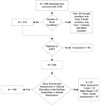Academic proficiency in children after early congenital heart disease surgery
- PMID: 24000004
- PMCID: PMC3946912
- DOI: 10.1007/s00246-013-0781-6
Academic proficiency in children after early congenital heart disease surgery
Abstract
Children with early surgery for congenital heart disease (CHD) are known to have impaired neurodevelopment; their performance on school-age achievement tests and their need for special education remains largely unexplored. The study aimed to determine predictors of academic achievement at school age and placement in special education services among early CHD surgery survivors. Children with CHD surgery at <1 year of age from January 1, 1998 to December 31, 2003, at the Arkansas Children's Hospital were identified. Out-of-state births and infants with known genetic and/or neurologic conditions were excluded. Infants were matched to an Arkansas Department of Education database containing standardized assessments at early school age and special-education codes. Predictors for achieving proficiency in literacy and mathematics and the receipt of special education were determined. Two hundred fifty-six children who attended Arkansas public schools and who had surgery as infants were included; 77.7 % had either school-age achievement-test scores or special-education codes of mental retardation or multiple disabilities. Scores on achievement tests for these children were 7-13 % lower than those of Arkansas students (p < 0.01). They had an eightfold increase in receipt of special education due to multiple disabilities [odds ratio (OR) 10.66, 95 % confidence interval (CI) 4.23-22.35] or mental retardation (OR 4.96, 95 % CI 2.6-8.64). Surgery after the neonatal period was associated with decreased literacy proficiency, and cardiopulmonary bypass during the first surgery was associated with decreased mathematics proficiency. Children who had early CHD surgery were less proficient on standardized school assessments, and many received special education. This is concerning because achievement-test scores at school age are "real-world" predictors of long-term outcomes.
Conflict of interest statement
Dr. Mulkey receives funding from the University of Arkansas for Medical Sciences Center for Translational Neuroscience, the Arkansas Children’s Hospital Research Institute, and the Arkansas Biosciences Institute. The other authors have no conflicts of interest to disclose.
Figures
Similar articles
-
School-Age Test Proficiency and Special Education After Congenital Heart Disease Surgery in Infancy.J Pediatr. 2016 Nov;178:47-54.e1. doi: 10.1016/j.jpeds.2016.06.063. Epub 2016 Jul 22. J Pediatr. 2016. PMID: 27453376 Free PMC article.
-
Cognitive and academic consequences of bronchopulmonary dysplasia and very low birth weight: 8-year-old outcomes.Pediatrics. 2003 Nov;112(5):e359. doi: 10.1542/peds.112.5.e359. Pediatrics. 2003. PMID: 14595077 Free PMC article.
-
Association Between Transient Newborn Hypoglycemia and Fourth-Grade Achievement Test Proficiency: A Population-Based Study.JAMA Pediatr. 2015 Oct;169(10):913-21. doi: 10.1001/jamapediatrics.2015.1631. JAMA Pediatr. 2015. PMID: 26301959
-
Developmental progress of children with congenital heart defects requiring open heart surgery.Semin Pediatr Neurol. 1999 Mar;6(1):12-9. doi: 10.1016/s1071-9091(99)80042-4. Semin Pediatr Neurol. 1999. PMID: 10098225 Review.
-
Childhood Maltreatment and Educational Outcomes.Trauma Violence Abuse. 2015 Oct;16(4):418-37. doi: 10.1177/1524838014537908. Epub 2014 Jun 11. Trauma Violence Abuse. 2015. PMID: 24920354 Review.
Cited by
-
D-transposition of the great arteries: the current era of the arterial switch operation.J Am Coll Cardiol. 2014 Aug 5;64(5):498-511. doi: 10.1016/j.jacc.2014.06.1150. J Am Coll Cardiol. 2014. PMID: 25082585 Free PMC article. Review.
-
School-Age Developmental and Educational Outcomes Following Cardiac Procedures in the First Year of Life: A Population-Based Record Linkage Study.Pediatr Cardiol. 2019 Mar;40(3):570-579. doi: 10.1007/s00246-018-2029-y. Epub 2018 Dec 10. Pediatr Cardiol. 2019. PMID: 30535960
-
Functional limitations and educational needs among children and adolescents with heart disease.Congenit Heart Dis. 2018 Jul;13(4):633-639. doi: 10.1111/chd.12621. Epub 2018 Jul 22. Congenit Heart Dis. 2018. PMID: 30033554 Free PMC article.
-
School-Age Test Proficiency and Special Education After Congenital Heart Disease Surgery in Infancy.J Pediatr. 2016 Nov;178:47-54.e1. doi: 10.1016/j.jpeds.2016.06.063. Epub 2016 Jul 22. J Pediatr. 2016. PMID: 27453376 Free PMC article.
-
Investigating altered brain development in infants with congenital heart disease using tensor-based morphometry.Sci Rep. 2020 Sep 10;10(1):14909. doi: 10.1038/s41598-020-72009-3. Sci Rep. 2020. PMID: 32913193 Free PMC article.
References
-
- Hoffman JI. Congenital heart disease: incidence and inheritance. Pediatr Clin North Am. 1990;37:25–43. - PubMed
-
- Samanek M. Congenital heart malformations: prevalence, severity, survival, and quality of life. Cardiol Young. 2000;10:179–185. - PubMed
-
- Donofrio MT, Massaro AN. Impact of congenital heart disease on brain development and neurodevelopmental outcome. [Accessed May 15, 2013];Int J Pediatr. 2010 http://www.ncbinlmnih.gov/pmc/articles/PMC2938447/ - PMC - PubMed
-
- Hsia TY, Gruber PJ. Factors influencing neurologic outcome after neonatal cardiopulmonary bypass: what we can and cannot control. Ann Thorac Surg. 2006;81:S2381–S2388. - PubMed
Publication types
MeSH terms
Grants and funding
LinkOut - more resources
Full Text Sources
Other Literature Sources
Medical


